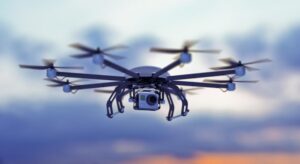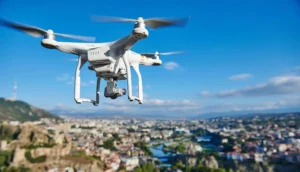Drones, also known as unmanned aerial vehicles (UAVs), have gained widespread popularity in recent years due to their ability to perform a variety of tasks such as aerial photography, surveillance, and delivery. However, the increased use of drones has also raised concerns about their security and privacy implications. In this article, we will discuss the security and privacy concerns with drone usage and the steps being taken to address them.
Security Concerns
One of the biggest security concerns with drone usage is the potential for drones to be used as weapons. Drones can be fitted with explosives or other weapons and used to carry out attacks on individuals or property. In 2019, two drones were used to attack a Saudi Arabian oil facility, causing significant damage and disruption to the global oil market.

Another security concern with drones is the potential for them to be hacked. Drones are essentially flying computers that can be remotely controlled, and this makes them vulnerable to hacking. A hacker could take control of a drone and use it to carry out an attack or steal sensitive data. In 2019, a researcher was able to hack into a drone using a $40 device and take control of it in mid-flight.
Drones can also be used for illegal surveillance. A drone equipped with a camera can be used to spy on individuals or monitor activities without their knowledge or consent. This can be particularly concerning in sensitive areas such as military installations or government buildings.
Privacy Concerns
One of the main privacy concerns with drones is the potential for them to be used for intrusive surveillance. Drones equipped with cameras can be used to capture images or video of individuals in public spaces without their knowledge or consent. This raises questions about the right to privacy and whether individuals have the right to expect a certain level of privacy when in public spaces.
Another privacy concern with drones is the potential for them to be used to collect and store sensitive data. Drones can be fitted with sensors that can collect a wide range of data such as GPS coordinates, temperature, and sound. This data can be used for a variety of purposes, including marketing and surveillance. However, the collection and storage of sensitive data raise concerns about data privacy and the potential for misuse.
Steps Being Taken to Address Concerns
Governments and industry leaders are taking steps to address the security and privacy concerns associated with drone usage. For example, the US Federal Aviation Administration (FAA) has established regulations for commercial drone usage that require operators to register their drones and follow certain safety guidelines. The regulations also require operators to obtain a remote pilot certificate and pass a knowledge test.
Industry leaders are also developing technologies to improve the security and privacy of drones. For example, some companies are developing drone detection systems that can identify and track drones in real-time. These systems can help to prevent unauthorized drone flights and detect drones that are being used for malicious purposes.

In addition, some companies are developing encryption technologies to protect the data collected by drones. This can help to ensure that sensitive data is not intercepted or stolen by hackers.
In addition to the steps being taken by governments and industry leaders, individuals can also take steps to protect themselves from the security and privacy risks associated with drone usage. For example, individuals can install privacy curtains or blinds in their homes to prevent drones from capturing images or video of their activities. They can also use anti-drone technology to detect and counter unauthorized drone flights.
Moreover, it is important to educate the public about the risks associated with drones and how to mitigate those risks. This includes educating individuals on how to fly drones safely and responsibly, as well as raising awareness about the potential for drones to be used for malicious purposes.
It is worth noting that the security and privacy concerns associated with drone usage are not limited to the use of commercial drones. Hobbyist drones, which are often used for recreational purposes, also raise security and privacy concerns. For example, hobbyist drones can be used to fly over private property, potentially invading individuals’ privacy. They can also be flown in restricted areas, such as airports, posing a significant security risk.
To address these concerns, governments around the world are developing regulations for hobbyist drone usage. These regulations typically require hobbyist drone operators to register their drones, follow certain safety guidelines, and fly their drones in designated areas. Additionally, some governments are developing no-fly zones for drones around sensitive areas, such as airports, to prevent unauthorized flights.
Another area of concern is the potential for drones to be used for cyberattacks. Drones can be used to deliver malware or to intercept wireless communications, potentially compromising sensitive information. To address this risk, companies are developing technologies to detect and prevent drone-based cyberattacks. For example, some companies are developing software that can detect drones in the vicinity of wireless networks and alert network administrators to potential threats.
Conclusion
The increased use of drones has raised significant security and privacy concerns. Drones can be used as weapons, hacked, and used for illegal surveillance. They can also be used to collect and store sensitive data, raising concerns about data privacy. Governments and industry leaders are taking steps to address these concerns, including establishing regulations for commercial drone usage, developing drone detection systems, and using encryption technologies to protect data. As drones continue to become more popular and ubiquitous, it is important to ensure that appropriate measures are taken to protect the security and privacy of individuals and organizations.









